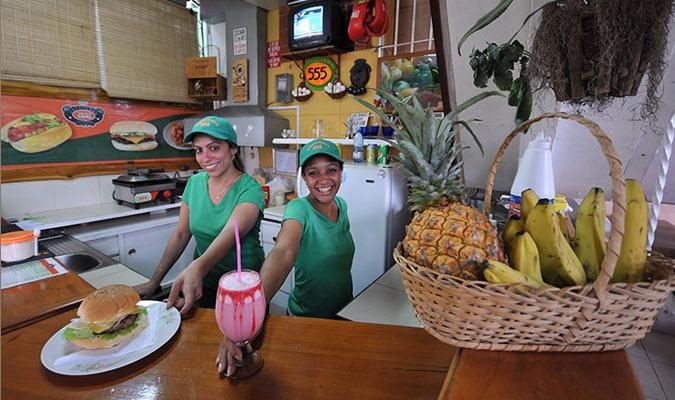Why do Cuban Self-Employed Workers no Longer Want to be Known as Self-Employed?
Young Cubans with businesses consider themselves entrepreneurs and not the “self-employed."
In February 2022 I returned to Cuba in order to continue what the pandemic interrupted: ethnographic research on economic actors in the private sector or cuentapropistas. After almost two years of pandemic and closed borders that prevented me from continuing my fieldwork, I found Havana eerily quiet, its streets desolate (except for the long lines in front of state-owned stores) and many private businesses closed, including some that were once overflowing with customers. As I sat down to talk with interlocutors, both old and new to the private sector, I became aware of other initially imperceptible ruptures, even more shocking changes.
One of these revealing moments occurred shortly after my arrival at a private café-bar located in an old but still elegant house in Vedado. The paint on its walls was somewhat intact and camouflaged with various plants and decorations from different eras - an anachronistic mix of ICAIC (Institute for Cinema and the Arts) posters and pre-revolutionary Esso and Coca-Cola signs. Waiting for me in the doorway was Cari [1], a self-identified luchadora (fighter) in the private sector whom I hadn't seen since 2019 and who already had new projects to tell me about. Before I sat down, Cari already informed me that the coffee shop had no coffee for sale that day, that I should start thinking about what juice I wanted instead. We were the only customers, which was made more uncomfortable given the mass of people at the bus stop a few meters from the café-bar.
Although the absence of café prompted the expected listing of the latest shortages in Cuba, Cari finally told me about a new business she was undertaking, an opportunity that arose amidst the material shortages and gaps created by cuentapropistas who had left the country. In that month of February 2022 alone, more than 16,000 Cubans crossed the U.S. border, among them many cuentapropistas who had once invested in - and bet on - a life project in Cuba. Although we did not know it at the time, that number would double in the following months to a total of 277,594 by the end of November, creating a record exodus in 2022 of Cuban emigrants to the United States.[2] And those are the ones who arrived to the United States. It is estimated that many more left the island for other countries such as Spain, Mexico and Panama.
Before I could finish congratulating Cari for surviving the swings of the pandemic market and reinventing herself as a cuentapropista, she immediately corrected me: "cuentapropistas only think about money, not me, I am an entrepreneur. I carry out my ideas and create something new". Although Cari was remunerated for her work, the important thing for her was to distance herself from the official term, cuentapropista, and to identify herself with a project that goes beyond making a profit, with a broader vision of the private sector in Cuba. Rather than an exception, Cari proved to be part of a larger phenomenon, which I documented throughout my fieldwork, both in person in Cuba and in digital spaces.
When I began this research, in 2018, cuentapropista was the standard noun for a person working in the non-state sector and in just a few years was almost eclipsed by other terms in popular discourse. Those who used to be cuentapropistas now assert they are emprendedores (entrepreneurs), "business owners" and even empresarios (businessmen after the approval of micro, small and medium-sized enterprises, or "Mipymes" in August 2021). This semantic change - at first glance, something seemingly insignificant - actually reflects a social and historical process of great importance. It represents a sustained effort in the private sector to distance itself from the stigma it has carried for decades.
Historial stigma
The stigma against the private sector began long before my interlocutors began to reject the term cuentapropista, as the word came to absorb decades of negative connotations. In particular, the 1960s were instrumental in anchoring certain prejudices against business owners, interweaving Marxist terminologies with particularities of the Cuban revolution - popular insults such as gusanos (worms), parásitos sociales (social parasites) and escoria (scum).
In the early years of the revolution, many business owners were part of the great exodus of opponents and critics of the new government, who were famously labeled gusanos. While the term dates back to the Cuban War of Independence when General Máximo Gómez used the word gusano to refer to Masabó, a mambí fighter executed for rape and robbery, [3] the derogatory term was applied to "counterrevolutionaries" after 1959. With the official announcement of the communist character of the revolution in April 1961, more Marxist language was explicitly introduced to describe the capitalist class, which fits well with this earlier notion of destructive and parasitic insects. As Karl Marx writes in the first volume of Das Kapital, "capital is dead labor which only reanimates, vampire-like, by sucking living labor, and which lives all the longer the more living labor it sucks from".[4]

This stigma against a "bourgeois" class was reinforced in Cuba not only in official discourse and media, but also in educational programs, particularly ideological schools for workers and programming aimed at children. As in the Basic Schools of Revolutionary Instruction (EBIR) and the Communist Pioneers, they sought to inculcate the new revolutionaries against the "parasites" and "traitors," reducing Marxist-Leninist theory to simple phrases such as "he who does not work does not eat.[5]
During the early years of the revolution, such disdain was mostly reserved for "capitalists" who fled Cuba during the first waves of nationalization, but in 1968 this negative characterization expanded to the owners of micro and small businesses that had survived or emerged after nationalizations. Although many of these business owners considered themselves fidelistas and contributors to the socialist economy, Fidel Castro called them corrupt and immoral "social parasites" in a decisive speech on March 13, 1968. In that same speech, he announced the Revolutionary Offensive that would soon nationalize the vast majority of what remained of the private sector, some 58,012 businesses. He justified the measure with the following:
"There still subsists a true cream of privileged people...Lazy people, in perfect physical condition, who set up a timbiriche (a hole in the wall), any little business, to earn 50 pesos every day, violating the law and violating hygiene, violating everything, while they watch the trucks of women go by to work in the Cordón de La Habana or to pick tomatoes in Güines or elsewhere. If many people wondered what kind of revolution this is that allows such kind of parasites even after nine years in power, they would have every reason to wonder. And we believe that we must go about firmly proposing to put an end to all parasitic activity that subsists in the Revolution."[6]
He then described the moral failings and corruption of private businesses, describing the findings of an investigation into the 995 bars in Havana carried out by members of the Communist Party of Cuba (PCC) and the Committees for the Defense of the Revolution (CDR). According to these results, this sector was excessively lucrative and plagued by illegal operations, poor sanitary conditions, "anti-social" clientele and "counterrevolutionary attitudes". This characterization was strengthened by a series of articles against private enterprise in general, and bars in particular, published in the Cuban Communist Party newspaper, Granma, and in the magazine Bohemia. [7] Local CDRs (neighborhood committees for the defense of the revolution) literally drove the message home, organizing street demonstrations against these small business owners, sometimes even with mock funerals and vigils at their doorsteps. Neighbors shouted insults and threats. Even the word paredón (firing squad) was heard again in the Cuban streets.[8]
Although self-employment reappears, authorized in a limited form in moments of crisis (with reforms in 1978, 1993, and 2010/2011), the prejudices consolidated during the first decade of the revolution proved enduring. In fact, over time new insults were incorporated from the official discourse. María del Carmen, a veteran of cuentapropismo in the 1990s and 2000s, described her experience in those years: "it was very difficult, we cuentapropistas were escoria 'scum'...we were very much frowned upon". Acknowledging that the same pejorative term "scum" was used to describe the "unwanted marielitos" of the 1980s exodus[9] as well as private economic actors in the following decades, she reveals that they were still considered antithetical to the revolution and its values, as Fidel Castro had openly stated decades earlier. Although María del Carmen assures me that today the popular image of the cuentapropista has improved, my interlocutors insist that cuentapropista is a word that is still marked by this past.
Contemporary Stigma
These historical stains and their contemporary traces have motivated the gradual rejection of the term cuentapropista - a portmanteau for "worker for own account"- in the private sector. According to the entrepreneurs who collaborated with my research, the semantics surrounding cuentapropista reflect deeply rooted ideas - notions of informality, of marginality and even corruption (because the term cuentapropista is a "made-up" word with no international equivalents) of selfishness and greed (because of the emphasis on "own account"), and of low ambition and limited scope.
Regarding informality and marginalization, Gustavo, an advocate of private entrepreneurship frustrated with the official term, explained: "The world over, a cuentapropista is someone who does not pay taxes. In Mexico, for example, it is someone who works on the street...someone who is outside the law. This is not the Cuban case". Julio, a graphic designer, confessed: "cuentapropista is a strange invented term, you don't see it anywhere outside Cuba. In addition to being a weir word, it's not pretty...I don't like it." Among some of my interlocutors, there is a notion that the lack of global equivalence contributes to the disdain for the private sector in Cuba, as it does not seem to be something "normal," established or respected.
Similarly, cuentapropista is also associated with corruption and greed, especially in state media. Pablo, an entrepreneur who left the state sector to start a software development business, summarized years of bad coverage in official television and press:
"Although in speeches officials declared that the private sector had come to stay, in the beginning the cuentapropistas were demonized, even in soap operas, where they were always making shady deals and breaking the law.... now the government still accuses the cuentapropistas and Mipymes (small and medium-sized enterprises) of corruption, and more recently, even blames them for inflation and high prices when they are not to blame...these are clearly problems with structural causes."[10]
As in the 1960s, contemporary stigma has centered on the idea that cuentapropistas are greedy and money-driven, regardless of the legal framework or moral cost. As Alexei, a philologist who now owns taxi cabs, observed, "to me, "cuentapropista' sounds very individualistic...with strong connotations with capitalism, the discourse about class struggle between workers and bourgeois."
These connotations of selfishness and greed, especially in the face of a people affected by an acute economic crisis, sometimes resonate with the entrepreneurs themselves, who are also tired of incessantly rising prices. Some of my interlocutors have even accused other cuentapropistas of charging extremely high prices to maintain luxurious lifestyles, with cars and frequent vacations to Cuba's most exclusive beaches such as the northern keys and Varadero. These notions were so strong that in 2020 Cuban independent media outlets El Toque and Periodismo de Barrio organized a panel with prominent figures from the private sector, specifically titled: "Workers in the Private Sector: Neither Corrupt nor Enemies". The focus among the panelists was to speak from their reality and rehabilitate the image of the more than 602,400 people who worked in the private sector at the time.[11]
Finally, in the private sector itself, the word cuentapropista has negative connotations, as it represents an intentionally limited legal category. My interlocutors are well acquainted with the evolution of self-employment over the past decades and see a clear pattern: each reform in this regard has come on the heels of one crisis or another. As such, they recognize that for the Cuban government, the private sector is a "necessary evil" that has historically been restricted or "frozen" as soon as possible to stop its growth. The restrictions imposed over the years - limitations on the number of licenses, the enumerated lists of permissible activities, the changing tax system, among many others - and the frequency with which they change have produced a tense relationship between a private sector eager to grow and the government that regulates it.
For many of my interlocutors, the official term comes to represent that resentment within its legal and regulatory framework. That's why Yosvani, a coffee shop owner, explained to me that he is an "entrepreneur... that cuentapropista is legal, it's a legal term." Mariana, who also works in the gastronomic sector, goes further, suggesting that cuentapropista actually represents a license, it does not describe a person, especially entrepreneurial people with dynamic ideas and a desire to do things beyond the imposed limitations and corresponding short-sightedness of the potential of the private sector.

Perhaps as an expression of rebellion or resentment with the status quo, for some of the younger entrepreneurs the term cuentapropista has acquired yet another negative connotation: being too "communistoid." Mostly in their 20s and 30s, these interlocutors use this word in a derogatory way, linking cuentapropista with the regime, with its limited vision of the private sector and an economy in constant crisis. They prefer to identify with other labels that better describe their divergent views of private entrepreneurship in Cuba.
New Terms, New Visions
Cuban entrepreneurs, like many of their compatriots, are sensitive to semantics and choose their words carefully to avoid scrutiny and attacks, both popular and official, and to project another vision of themselves. To move away from cuentapropista is to move away from stigma and, perhaps more importantly, an opportunity to rethink the private sector beyond existing negative conceptions and limitations. As an alternative, my interlocutors and other economic actors began to use other terms to self-identify, most notably "entrepreneur." As early as 2021, a Calabuche and Panellas survey revealed that today they are the majority: 82% of the business owners surveyed identified themselves as "entrepreneurs," while only 9.8% considered themselves cuentapropistas and 8.1% considered themselves both. Among the respondents who identified themselves as cuentapropistas, they considered it more of a legal and technical label.[12]
In my forthcoming doctoral dissertation, I analyze the discourse around "entrepreneur" in the private sector and the process of collectively defining what it means to be an entrepreneur in today's Cuba. I argue that new economic roles and relationships gave way to unprecedented new public spheres, which not only made this debate possible, but also resulted in a reformulation of the Cuban private sector - an autochthonous of global entrepreneurial ideals with existing local values. In doing so, Cuban entrepreneurs are shaping their own economic and social identities, their commitments to and role in national development, and even charting a new path forward for Cuba, one where economic development does not come at the expense of collective well-being.
References
Casavantes Bradford, Anita. 2014. The Revolution Is for the Children: The Politics of Childhood in Havana and Miami, 1959-1962. Chapel Hill, NC: The University of North Carolina Press.
Castro Ruz, Fidel. 1968. "Discurso Pronunciado Por El Comandante Fidel Castro Ruz, Primer Secretario Del Comité Central Del Partido Comunista de Cuba y Primer Ministro Del Gobierno Revolucionario, En El Acto Conmemorativo Del XI Aniversario de La Acción Del 13 de Marzo de 1957, Efectuado En La Escalinata de La Universidad de La Habana". Departamento de versiones taquigrafícas del gobierno revolucionario.
García, Iván. 2018. “‘Revolutionary’ Offensive Against Private Work Began in 1959.” WordPress. Translating Cuba. March 23, 2018.
Guerra, Lillian. 2012. Visions of Power in Cuba: Revolution, Redemption, and Resistance, 1959-1971. Chapel Hill, NC: University of North Carolina Press.
Martí, José. 2003. Diario de Campaña. Biblioteca Virtual Universal.
Marx, Karl, and Friedrich Engels. 1978. The Marx-Engels Reader. Edited by Robert C. Tucker. 2d ed. New York: Norton.
Pedraza, Silvia. 1998. “Cuba’s Revolution and Exodus.” Journal of the International Institute 5 (2).
Panellas Álvarez, Daybel, e Ileana Díaz Fernández, eds. 2021. Emprendimientos Privados: Resiliencia y Articulación Con Empresas Estatales. Santo Domingo: Fundación Friedrich Ebert (FES).
Interviews and Fieldwork (pseudonyms):
Alexei. Interview by Miranda M. García, Havana, Cuba, March 12, 2022.
Caridad “Cari.” Interview by por Miranda M. García, Havana, Cuba, February 2022.
Gustavo. Interview by Miranda M. García, Havana, Cuba, May 27, 2022.
Julio. Interview by Miranda M. García, Havana, Cuba, May 12, 2022.
María del Carmen. Paper to a seminar on entrepreneurial women. Havana, Cuba, March 24, 2022.
Mariana. Interview by Miranda M. García, Havana, Cuba, March 18, 2022.
Pablo. Paper in Facebook Live, November 1, 2022.
Yosvani. Interview by Miranda M. García, Havana, Cuba. May 11, 2022.
[1] To protect the identity of my interlocutors, all names in this article are pseudonyms.
[2] U.S. Customs and Border Protection.
[3] The incident was written by José Martí in his Diario de Campaña: "Bryson leaves. Shortly after, Masabó's court-martial. He raped and robbed. Rafael presides, and Mariano accuses. Masabó somber, denies: brutal face. His defender invokes our arrival, and begs mercy. To death. As they read the sentence, in the background, from the crowd, a man peels a cane. Gomez harangues: 'This man is not our comrade: he is a vile worm'. Masabó, who has not sat down, raises his eyes hatefully at him. The forces, in great silence, hear and applaud: 'Que viva!' And while they order the march, standing Masabó remains, without his eyes falling, nor in the body box is fear visible: the pants, wide and light, fly at him without ceasing, as to a swift wind. At last they go, the cavalry, the prisoner, the whole force, to a nearby basso; into the sun. Serious moment, that of the silent, huddled force. The shots sound, and another one more, and another one of auction. Masabó has died brave. How do I stand Colonel? Front or back?' 'Front.”
[4] Karl Marx and Friedrich Engels, “Capital Volume I” en the The Marx-Engels Reader, edited by Robert C. Tucker, 2d ed. (New York: Norton, 1978).
[5] Historian Lillian Guerra provides a detailed description of the adult curriculum in the EBIRs: adult programs were largely based on core texts, such as Blas Roca's Los fundamentos del socialismo en Cuba and a Spanish translation of Otto Wille Kuusinen's Manual de Marxismo-Leninismo, although in practice these texts were reduced to simpler concepts and slogans. Guerra, 216-17, 221.
On children's programming, historian Anita Casavantes Bradford explains how the Pioneers and the Children's Defense Committees (CDI) were important avenues for disseminating the new socialist ideology among the youth population (Casavantes Bradford 2014, 92-120).
[6] Fidel Castro Ruz, 1968. "Discurso Pronunciado por El Comandante Fidel Castro Ruz, Primer Secretario Del Comité Central Del Partido Comunista de Cuba y Primer Ministro Del Gobierno Revolucionario, en el acto conmemorativo del XI Aniversario de la Acción del 13 de marzo de 1957, efectuado en la Escalinata de la Universidad de La Habana", Departamento de Versiones Taquigráficas del Gobierno Revolucionario.
[7] Iván García, "'Revolutionary' Offensive Against Private Work Began in 1959," Translating Cuba, March 23, 2018.
[8] Guerra, 301- 302
[9] Silvia Pedraza, “Cuba’s Revolution and Exodus,” Journal of the International Institute, 5 (2).
[10] He was probably referring to the program Tras la Huella, which has had several chapters like the following one where cuentapropistas are involved in serious crimes.
[12] Calabuche y Pañellas 2021 in Daybel Pañellas Álvarez e Ileana Díaz Fernández, eds., Emprendimientos Privados: Resiliencia y Articulación Con Empresas Estatales (Santo Domingo: Fundación Friedrich Ebert (FES), 2021), 6-7.

Miranda García is a PhD candidate in the University of Michigan’s Department of Anthropology. She studies new media, advertising, entrepreneurship, and identity in Cuba and its diaspora. Her work draws on ethnography, oral history, and semiotic analysis to explore topics ranging from collective memory in Little Havana nostalgia shops to her current project on Cuba’s emerging advertising industry. Miranda's research has been supported by the National Science Foundation (NSF), the Wenner-Gren Foundation, the Weiser Center for Emerging Democracies, and the Mellon Mays Foundation, among others.

